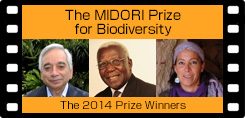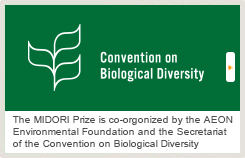15/09/2015
Winning Projects of the Japan Awards for Biodiversity 2015 announced
Mr. Takuya Okada, Chairman of the AEON Environmental Foundation, announced the five winning projects of the Japan Awards for Biodiversity 2015 on September 15, 2015. The winning projects of the 2015 Awards are as follows.
◆ The Advanced Promotional Project on the Appropriate Resource Use of Hokkaido Sika Deer Meat (Yezo Deer Association)
◆ Ohya Hummingbird Project (Kesennuma City Ohya Junior-High School)
◆ Efforts toward the Conservation of Biodiversity through “Green Tea for Beautiful Lake Biwa” and “Green Tea for Beautiful Japan” Projects (Itoen, Ltd.)
◆ Citizens’ Efforts for the Restoration and Revitalization of the Damaged Genbegawa River to the Biodiverse River (NPO Groundwork Mishima)
◆ Conservation and Restoration of Water Environments and the Activation of Regions (River Cheering Squad in Kyushu/Watershed Management Laboratory (Prof. Shimatani), Kyushu University)
The Japan Awards for Biodiversity, a domestic prize, was established by the AEON Environmental Foundation in 2009 in commemoration of the tenth meeting of the Conference of the Parties to the Convention on Biological Diversity (COP10) in Nagoya, Japan, in order to promote the conservation and sustainable use of biodiversity. In 2010, “The MIDORI Prize for Biodiversity,” an international prize, was also established. These prizes are both biennial and are awarded alternately.
In this, the fourth year of the Japan Awards, “what is biodiversity” was considered from various perspectives including new viewpoints such as use, culture and genetic resources, sustainable regional development, mainstreaming, behavior change (encouragement of actions), diverse sector cooperation, technologies by small and medium-sized organizations, ideas highlighting Japanese characteristics, civil perspectives and feasibilities.
In 2015, the number of applications was 126 in total. On the basis of a preliminary evaluation by the Working Group of Specialists, the Judging Committee selected five distinguished projects as Excellence Awards.
The Grand Prix of the Japan Awards will be selected from the five projects and announced at an award ceremony to be held at U Thant Hall of the United Nations University (Tokyo, Japan) on October 20, 2015.
The Grand Prix project is awarded a certificate and a monetary prize of two million yen. Also, each Excellence Award project is awarded a certificate and a monetary prize of one million yen.
■ Outline of the Award Winning Projects
◆ The Advanced Promotional Project on the Appropriate Resource Use of Hokkaido Sika Deer Meat
(Yezo Deer Association)
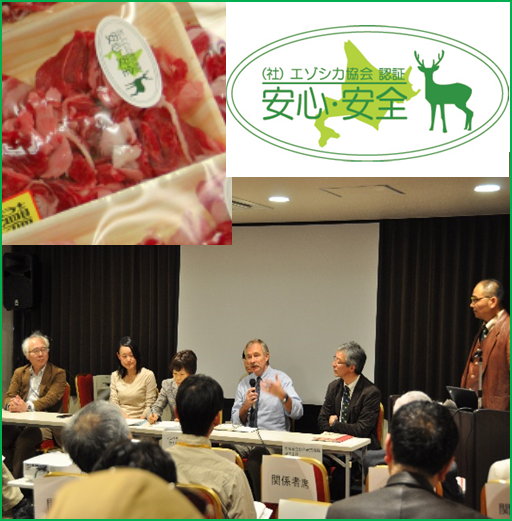 In Hokkaido where sika deer (Cervus nippon) problem has been serious and the effective population management has been required, there was an urgent need to develop systems for the appropriate use of deer meat which also can contribute to forest conservation. However, a meat hygiene management system, which is most important for meat use, was not yet prepared for wildlife. Then in 2007, the Yezo Deer Association established a quality certification system for deer meat treated by facilities that met strict hygiene standards. In 2012, the Association started a quality certification system for processed foods of deer meat produced by certified factories. Since 2015, the Association has made efforts to establish a certification system for deer cullers who can also serve as deer meat inspectors. This project is to establish appropriate relationships among forests, deer and humans, and to make contributions to the improvement of the value of deer meat as a resource through the safe and secure distribution of deer meat.
In Hokkaido where sika deer (Cervus nippon) problem has been serious and the effective population management has been required, there was an urgent need to develop systems for the appropriate use of deer meat which also can contribute to forest conservation. However, a meat hygiene management system, which is most important for meat use, was not yet prepared for wildlife. Then in 2007, the Yezo Deer Association established a quality certification system for deer meat treated by facilities that met strict hygiene standards. In 2012, the Association started a quality certification system for processed foods of deer meat produced by certified factories. Since 2015, the Association has made efforts to establish a certification system for deer cullers who can also serve as deer meat inspectors. This project is to establish appropriate relationships among forests, deer and humans, and to make contributions to the improvement of the value of deer meat as a resource through the safe and secure distribution of deer meat.
◆ Ohya Hummingbird Project
(Kesennuma City Ohya Junior-High School)
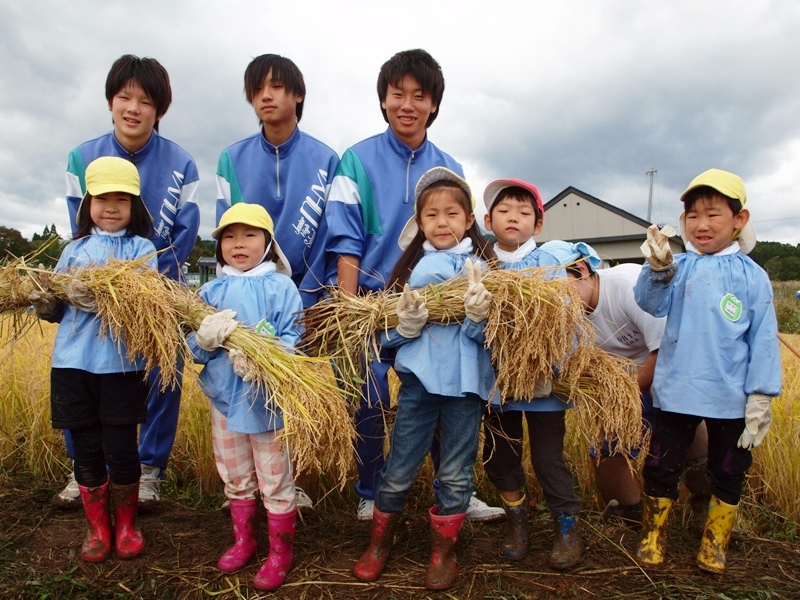 The Ohya area in Kesennuma City, which has warm and cold currents in the adjacent sea area, is blessed with a rich natural environment. However, agriculture and fisheries have diminished in scale and the number of farmers and fishermen has been decreasing. Due to this, the natural environment which supported lives in Ohya was not cared for, and pine wilt disease and sea deforestacion occurred consecutively. In order to conserve nature and livelihoods in these circumstances, the students of Ohya Junior-High School started on “Do what I can do.” As pine wilt disease relates to forestry and sea deforestacion relates to fisheries, a system to study nature in Ohya in its entirety, covering agriculture including fuyumizutambo (an agricultural method of flooding rice paddies in winter), was established. These activities were expanded to become the “Ohya Hummingbird Project” where children and students from Ohya Kindergarten, Primary and Junior High schools work together in cooperation with regional organizations and research institutions. The project has been developing activities to vitalize the Ohya area.
The Ohya area in Kesennuma City, which has warm and cold currents in the adjacent sea area, is blessed with a rich natural environment. However, agriculture and fisheries have diminished in scale and the number of farmers and fishermen has been decreasing. Due to this, the natural environment which supported lives in Ohya was not cared for, and pine wilt disease and sea deforestacion occurred consecutively. In order to conserve nature and livelihoods in these circumstances, the students of Ohya Junior-High School started on “Do what I can do.” As pine wilt disease relates to forestry and sea deforestacion relates to fisheries, a system to study nature in Ohya in its entirety, covering agriculture including fuyumizutambo (an agricultural method of flooding rice paddies in winter), was established. These activities were expanded to become the “Ohya Hummingbird Project” where children and students from Ohya Kindergarten, Primary and Junior High schools work together in cooperation with regional organizations and research institutions. The project has been developing activities to vitalize the Ohya area.
◆ Efforts toward the Conservation of Biodiversity through “Green Tea for Beautiful Lake Biwa”and“Green Tea for Beautiful Japan”Projects
(Itoen, Ltd.)
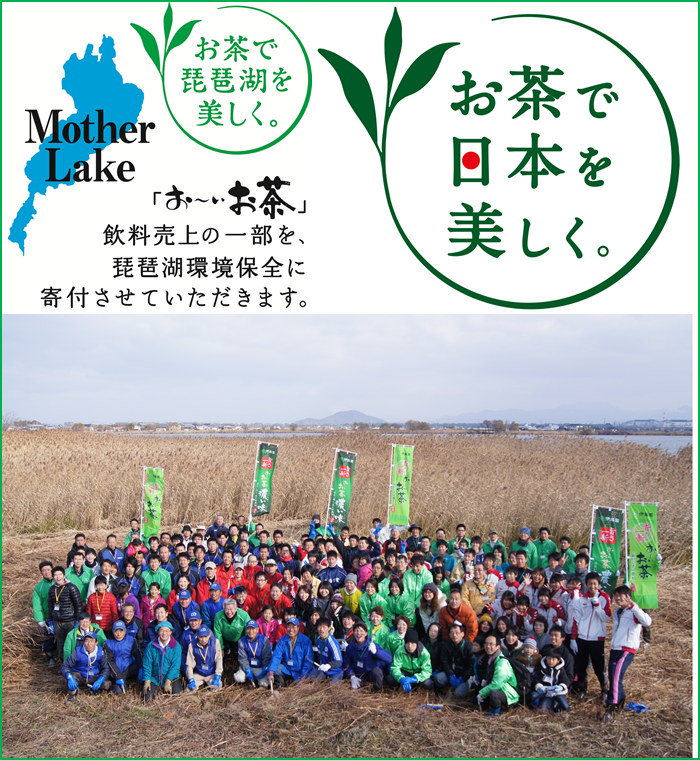 Itoen, Ltd. has conducted environmental conservation activities for Lake Biwa, “Green Tea for Beautiful Lake Biwa Project,” based on the company’s design concept to conserve the lake through green tea, one of its major products. The company established a sustainable system to encourage participating employees to learn about local needs and nature conservation through the project as their capacity development. Making the best use of its experiences, their efforts were expanded to the “Green Tea for Beautiful Japan” project. 201 branches were placed as project “platforms,” and the donations and the activities conducted by employees and volunteers were brought together along with the cooperation of consumers, administrative bodies, NPOs and communities. Itoen has continued these projects aiming at CSR activities which lead to the conservation of biodiversity and to regional/ human resource development.
Itoen, Ltd. has conducted environmental conservation activities for Lake Biwa, “Green Tea for Beautiful Lake Biwa Project,” based on the company’s design concept to conserve the lake through green tea, one of its major products. The company established a sustainable system to encourage participating employees to learn about local needs and nature conservation through the project as their capacity development. Making the best use of its experiences, their efforts were expanded to the “Green Tea for Beautiful Japan” project. 201 branches were placed as project “platforms,” and the donations and the activities conducted by employees and volunteers were brought together along with the cooperation of consumers, administrative bodies, NPOs and communities. Itoen has continued these projects aiming at CSR activities which lead to the conservation of biodiversity and to regional/ human resource development.
◆ Citizens’ Efforts for the Restoration and Revitalization of the Damaged Genbegawa River to the Biodiverse River
(NPO Groundwork Mishima)
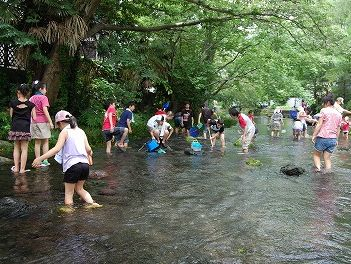 The Genbegawa River in Mishima City, Shizuoka Prefecture, was seriously damaged in the 1960s due to environmental deterioration along with the high economic growth in Japan. In order to restore the Genbegawa River, NPO Groundwork Mishima has conducted practical and sustainable groundwork activities through developing a partnership with citizens, NPOs, firms and administrative institutions, and made great contributions to the revival of the water environment as an important hometown landscape for Mishima, known as a “city of water.” Groundwork Mishima has played a role of coordinator among the parties, built a framework for regional cooperation in order to make the best use of respective specialties, and conducted citizen-driven “multiple cooperation projects” that help resolve regional problems. These citizen-driven activities have been developed since 1992, aiming at the restoration of biodiversity in Mishima, and now greatly influence “regional restoration and tourism promotion.”
The Genbegawa River in Mishima City, Shizuoka Prefecture, was seriously damaged in the 1960s due to environmental deterioration along with the high economic growth in Japan. In order to restore the Genbegawa River, NPO Groundwork Mishima has conducted practical and sustainable groundwork activities through developing a partnership with citizens, NPOs, firms and administrative institutions, and made great contributions to the revival of the water environment as an important hometown landscape for Mishima, known as a “city of water.” Groundwork Mishima has played a role of coordinator among the parties, built a framework for regional cooperation in order to make the best use of respective specialties, and conducted citizen-driven “multiple cooperation projects” that help resolve regional problems. These citizen-driven activities have been developed since 1992, aiming at the restoration of biodiversity in Mishima, and now greatly influence “regional restoration and tourism promotion.”
◆ Conservation and Restoration of Water Environments and the Activation of Regions
(River Cheering Squad in Kyushu/Watershed Management Laboratory (Prof. Shimatani), Kyushu University)
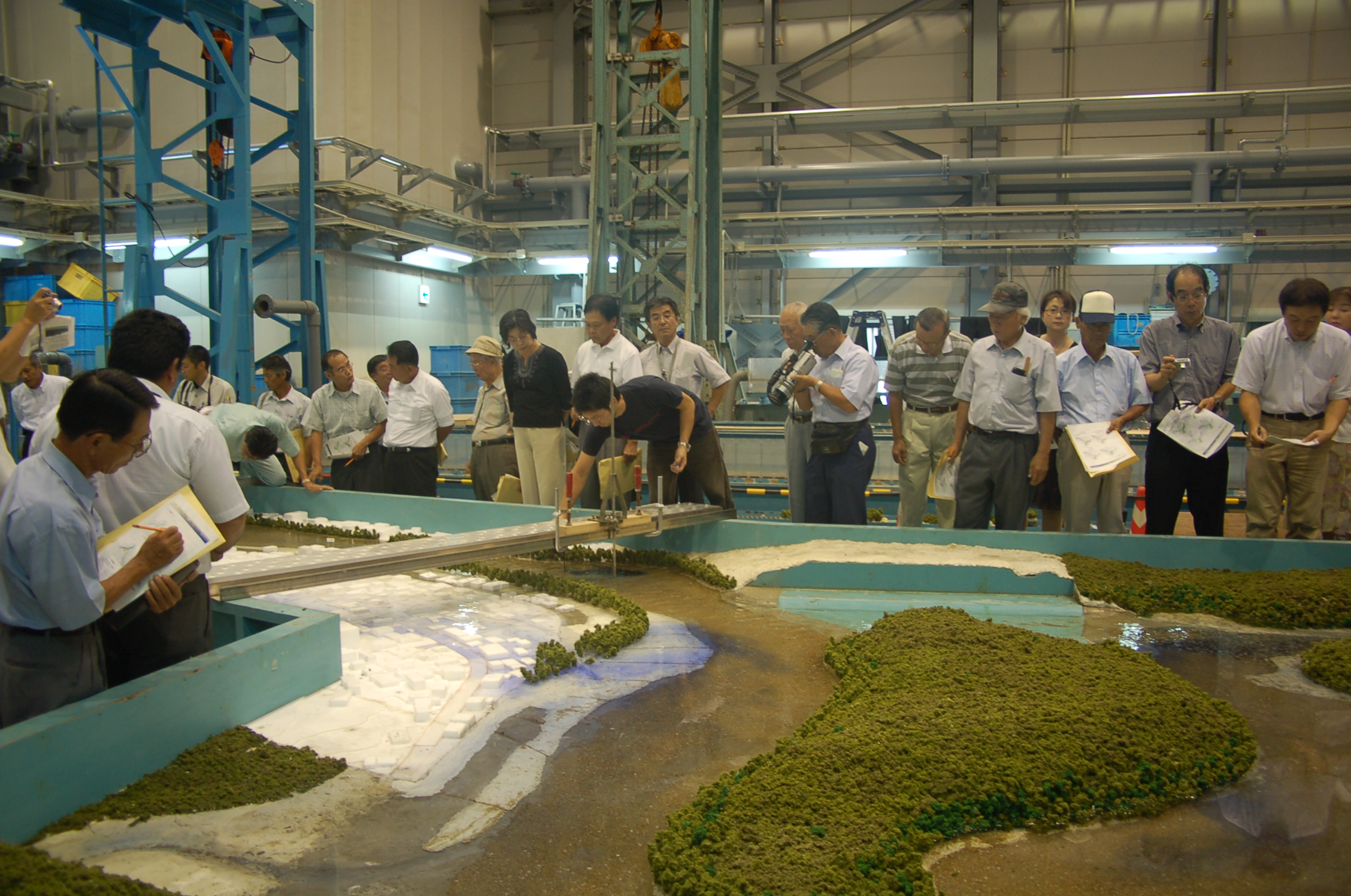 The River Cheering Squad in Kyushu has made and conducted technical proposals contributing to biodiversity based on its in-depth scientific research. The members of the group have also made great efforts in sharing the wonders and richness of biodiversity through showing their visualized ideas to citizens. Also, they have largely contributed to the vitalization of the regions in cooperation with various parties through planning river environment projects, initiating these projects, conducting small-scale nature restoration, consulting with citizens, building consensus, making frameworks leading to regional activation, implementing environmental education, and developing interest-encouraging projects on the conservation and the restoration of biodiversity in river environments.
The River Cheering Squad in Kyushu has made and conducted technical proposals contributing to biodiversity based on its in-depth scientific research. The members of the group have also made great efforts in sharing the wonders and richness of biodiversity through showing their visualized ideas to citizens. Also, they have largely contributed to the vitalization of the regions in cooperation with various parties through planning river environment projects, initiating these projects, conducting small-scale nature restoration, consulting with citizens, building consensus, making frameworks leading to regional activation, implementing environmental education, and developing interest-encouraging projects on the conservation and the restoration of biodiversity in river environments.
■ Outline of the Japan Awards for Biodiversity 2015
Organization:
AEON Environmental Foundation
Support:
Ministry of the Environment, Japan
Japan Committee for United Nations Decade on Biodiversity
K.K. Kyodo News, The Asahi Shimbun Company, The Mainichi Newspapers, The Yomiuri Shimbun
Requirements:
* Organizations, institutions, companies, or individuals living in Japan
* Projects contributing to the conservation, sustainable use, distribution and enlightenment of biodiversity
■ The Judging Committee for The Japan Awards for Biodiversity 2015 (Honorifics omitted)
Committee Chairman
| Takuya Okada | Chairman, AEON Environmental Foundation |
|---|
Judges (Alphabetical order)
| Manabu Akaike | Director, Universal Design Intelligence Inc., Science Journalist |
|---|---|
| Kunio Iwatsuki | Professor Emeritus, The University of Tokyo |
| Ryo Kohsaka | Associate Professor, Graduate School of Human and Socio-Environmental Studies, Kanazawa University |
| Daizaburo Kuroda | Senior Fellow, Institute for Global Environmental Strategies |
| Anne McDonald | Professor, Graduate School of Global Environmental Studies, Sophia University |
| Jun-ichi Takeda | Secretary General of Support Center for Rural Communities, Tokyo University of Agriculture |








